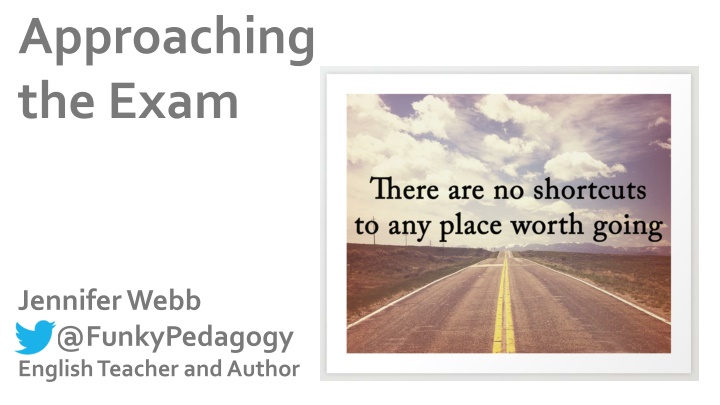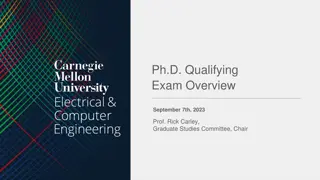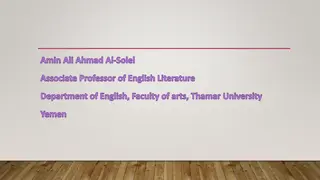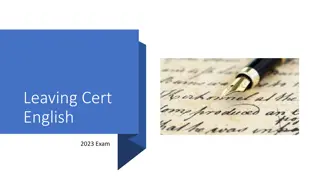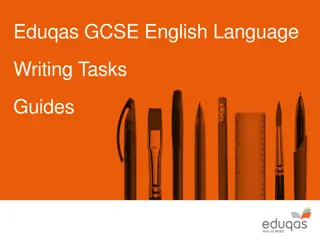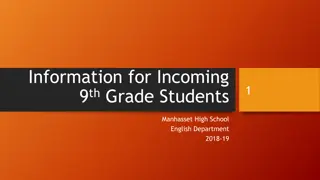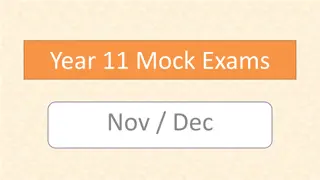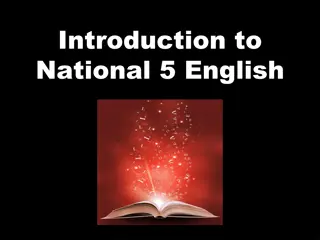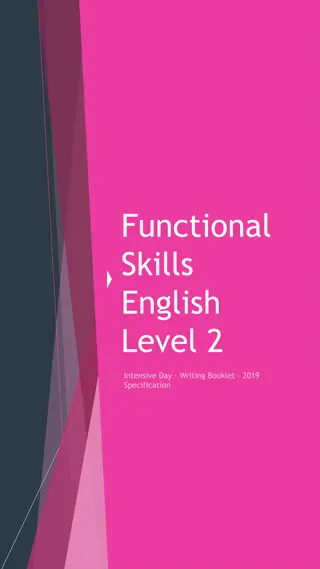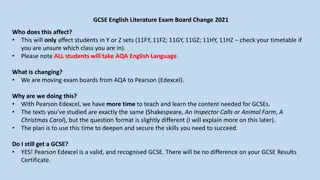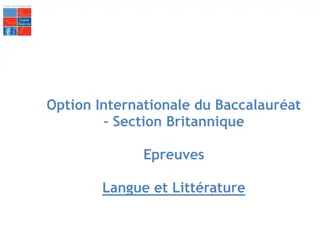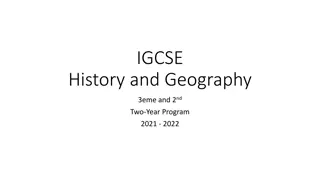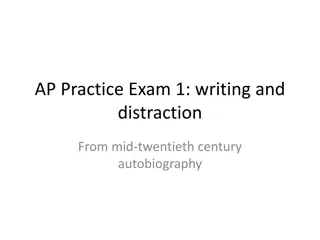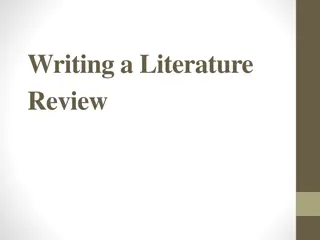Mastering Exam Writing Techniques for English Literature
Prepare effectively for your English literature exams by understanding the importance of clarity, structure, and accurate writing. Focus on genre understanding, textual references, and using language you comprehend. Avoid unnecessary comparisons and apply critical theory subtly to enhance your responses. Improve your writing skills to craft concise and selective answers within the given constraints for better exam performance.
Download Presentation

Please find below an Image/Link to download the presentation.
The content on the website is provided AS IS for your information and personal use only. It may not be sold, licensed, or shared on other websites without obtaining consent from the author.If you encounter any issues during the download, it is possible that the publisher has removed the file from their server.
You are allowed to download the files provided on this website for personal or commercial use, subject to the condition that they are used lawfully. All files are the property of their respective owners.
The content on the website is provided AS IS for your information and personal use only. It may not be sold, licensed, or shared on other websites without obtaining consent from the author.
E N D
Presentation Transcript
Approaching the Exam Jennifer Webb @FunkyPedagogy English Teacher and Author
This is a VERY LONG EXAM. It is hard work. You have been given this time for THINKING, not so that you can write a novel. The best scripts are those that write selectively and succinctly to answer the questions within the confines of twelve pages. Be judicious. Plan and craft your responses.
Holistic marking no tick-lists concentrate on answering the question set and let the assessment objectives look after themselves (examiner report 2018) Examiners are looking for a thorough understanding of genre. Do you know what this is? Can you articulate it for yourself? Closed book you need to know the texts inside and out! Close textual references are fine only use quotation marks when you are certain that you are accurate.
Writing skills AO1 It is important that students write in a clear, structured and accurate way and time needs to be spent working on writing skills since AO1 is tested in every question. It is also worth emphasising the importance of focusing on the task from the start and making a telling comment in the first sentence. Some students wrote introductions and conclusions which were vague, general or empty. (Examiner s Report, 2018)
Comparison Comparison is not required in this specification as the AO4 strand is met when students are connecting with the wider genre through focusing on the key tragic, comedic, crime and political and social protest writing aspects of the question. (Examiner s Report, 2018)
Use language which you understand! There was still reference to peripeteia, hubris, harmatia and anagnorisis which proved unhelpful to many students, obstructing their thinking. The best writing was produced by students who wrote carefully and relevantly using language they understood. (Examiner s Report, 2018)
Critical Theory Sometimes readings are imposed on texts that are not supported by evidence in the texts themselves and have no bearing on the question set. There needs to be some subtlety in the application of theoretical concepts. (Examiner s Report, 2018)
Context Some students, unfortunately, still thought they had to include all sorts of information, ideas or assertions about historical and biographical contexts, much of which was not well understood. (Examiner s Report, 2018)
Audience It is worth ensuring that students know what the word shocking means and then reminding them that it is unwise to claim that audiences of any time would have felt anything unless there is specific evidence to support the claim (...) They need to think what a Shakespearian audience comprised (different people with different views and proclivities, like those in their own literature classes, experiencing drama in a theatre probably not for the first time). Would all those people viewing Othello, for example, really have been shocked when they heard Emilia disobey Iago? Students need to be made aware that literature (and particularly drama) across time has plenty of references to the diabolical, to religion, to sex, to social order being overturned and to feisty and outspoken women. (Examiner s Report, 2018)
Engaging with statements YOU are a critic, too. Do you agree with the stated view? Is it too blunt or simple? Does it ignore important ideas? Can you challenge it, or explain nuance? What critical perspectives might be useful here? Underline key words what is the statement actually saying? Can you re-phrase it? How can you apply this view to the text you have studied? Is this statement true of this text? Can it be applied to other texts? Consider genre, period, movement, form... How can you apply this view to the tragic genre: conventions, narrative structure, form, character... Lear shows us that old age is the greatest tragedy of all. To what extent is this statement a reflection of the time and society in which the text was written? To what extent do you agree with this view? Remember to include in your answer relevant comment on Shakespeare s dramatic methods.
The bottom line... You CANNOT prepare for this exam by memorising essay content and hoping that your favourite topics will come up. You MUST embrace the joy of the challenge you will get questions you have never seen before, and you need to think about how to answer THOSE QUESTIONS... Practice by getting lots of mock questions and timing yourself writing plans for them. Give yourself at least 10 minutes to write a plan for each section.
